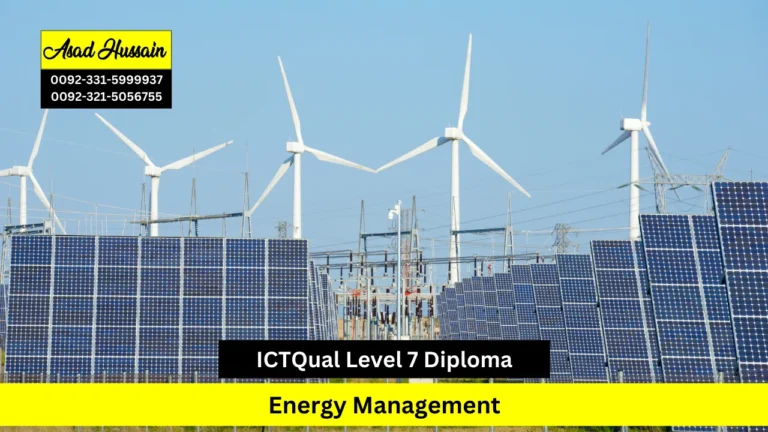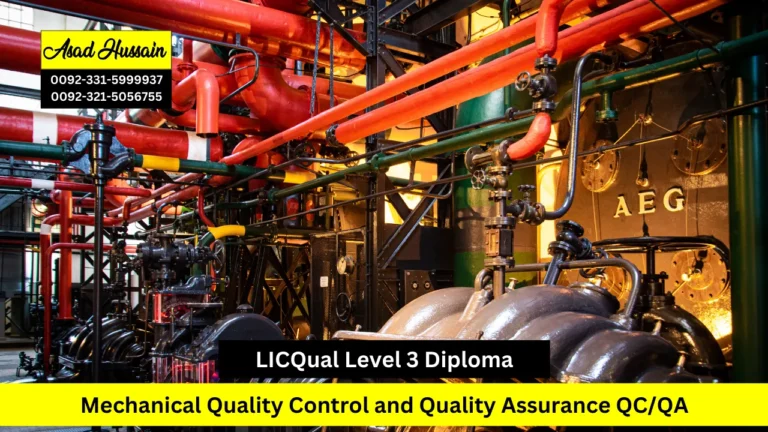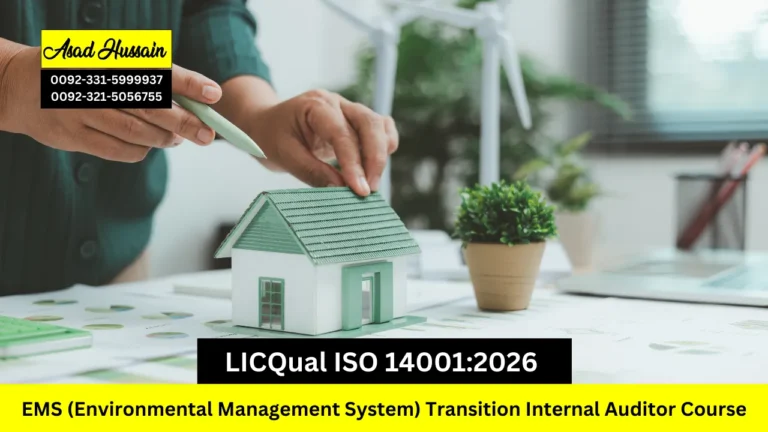The real estate and property management sector plays a pivotal role in shaping sustainable, profitable, and well-managed urban and commercial spaces. The diploma is designed to equip learners with advanced knowledge, practical skills, and strategic expertise essential for excelling in property management, real estate investment, and facility operations.
ICTQual ABLevel 6 International Diploma in Real Estate & Property Management covers key areas including property valuation, investment analysis, legal and regulatory frameworks, facilities management, financial management, risk assessment, tenant relations, and sustainability practices. Learners will gain the ability to apply professional methodologies to optimize property performance, increase return on investment, and maintain high standards of operational efficiency.
Through a comprehensive blend of theoretical instruction, practical case studies, and hands-on real-world projects, participants will gain a deep understanding of the principles and practices that underpin modern property management. The course equips learners with essential skills in property planning, strategic management, financial modeling, and investment analysis, while also emphasizing critical aspects such as legal compliance, risk assessment, and regulatory frameworks. In addition, participants will enhance their ability to communicate effectively with diverse stakeholders, including investors, tenants, regulatory authorities, and community members, ensuring that decisions are informed, ethical, and aligned with sustainable development goals.
Program Highlights
Study Units
Year 1 – Foundation in Real Estate & Property Management
- Principles of Real Estate and Property Management
- Introduction to Property Development Projects
- Construction Materials and Methods in Property
- Property Valuation Fundamentals
- Project Planning and Scheduling in Property Management
- Health, Safety, and Environmental Awareness in Property
- Communication and Stakeholder Management in Real Estate
- Digital Tools and Property Management Systems
- Financial Management in Property Projects
- Quality Assurance and Control in Property Management
- Legal and Regulatory Frameworks in Real Estate
- Professional Ethics and Conduct in Property Management
Year 2 – Intermediate Real Estate & Property Management Practices
- Advanced Property Valuation Techniques
- Resource Management and Allocation in Property Projects
- Project Cost Estimation and Budgeting in Real Estate
- Lease Administration and Contract Management
- Procurement and Supply Chain Management in Property
- Risk Analysis and Mitigation in Property Management
- Leadership and Team Management in Property Projects
- Facilities and Site Management
- Sustainable Development and Environmental Management in Real Estate
- Project Monitoring and Reporting in Property Management
- Problem-Solving and Decision-Making in Real Estate Projects
- Communication and Negotiation Skills in Property Management
Year 3 – Advanced Real Estate & Strategic Leadership
- Strategic Property Management and Investment
- Advanced Infrastructure and Property Planning
- Real Estate Portfolio Management
- Innovation and Emerging Technologies in Property
- Advanced Risk and Crisis Management in Property Projects
- Contract Management and Legal Compliance in Real Estate
- Leadership in Real Estate Projects
- Advanced Project Control and Performance Measurement
- Project Governance and Compliance in Property Management
- Research Methods and Project Analysis in Real Estate
- Capstone Project in Real Estate & Property Management
- Professional Development and Career Planning
To ensure learners are fully prepared for the diploma , specific entry requirements are set. These criteria guarantee that candidates possess the educational foundation, professional experience, and language skills necessary to engage with complex real estate concepts and property management strategies.
Age Requirements
- Applicants must be 18 years or older to enroll in ICTQual ABLevel 6 International Diploma in Real Estate & Property Management.
- Mature learners over 21 years are encouraged, especially those seeking to advance or transition into real estate and property management roles.
Educational Requirements
- Candidates should hold a Level 5 qualification or equivalent in real estate, property management, business, finance, or related fields.
- Relevant diplomas, technical certifications, or prior professional experience in property or facilities management may also be considered.
Professional Experience
- Work experience in property management, real estate consultancy, facilities management, or related sectors is advantageous.
- Practical exposure to property investment, leasing, and operations enhances the application of course concepts.
English Language Proficiency
- Non-native English speakers must demonstrate proficiency through recognized tests such as IELTS 6.0 or equivalent.
- Effective English communication is essential for report writing, stakeholder negotiations, and project management in global property markets.
Meeting these entry requirements ensures learners are fully prepared to maximize the benefits of this course. By enrolling in this diploma, participants will acquire the advanced knowledge, strategic insight, and practical skills necessary to succeed in real estate management, property investment, and facilities operations on a global scale.
The ICTQual AB Level 6 International Diploma in Real Estate & Property Management equips learners with the knowledge, technical skills, and professional competencies required to succeed in the global property sector. Spanning three years (360 credits), the programme covers foundational, intermediate, and advanced levels of property and real estate management, preparing graduates to take on leadership and strategic roles. Upon completing each unit, learners will demonstrate measurable outcomes aligned with international academic and industry standards.
Year 1 – Foundation in Real Estate & Property Management
Principles of Real Estate and Property Management
- Demonstrate an understanding of the fundamental concepts, scope, and functions of real estate and property management.
- Apply management principles to basic property operations and tenant relations.
- Recognize the importance of property maintenance, occupancy management, and client satisfaction.
Introduction to Property Development Projects
- Identify stages of property development projects from concept to delivery.
- Explain the roles of stakeholders in development planning and execution.
- Apply basic project initiation techniques to small-scale property projects.
Construction Materials and Methods in Property
- Understand the characteristics and applications of key construction materials.
- Evaluate appropriate methods for property construction and renovation.
- Apply material selection to enhance quality, durability, and sustainability.
Property Valuation Fundamentals
- Explain principles and approaches to property valuation.
- Apply basic valuation techniques to residential and commercial properties.
- Interpret valuation reports to support property transactions.
Project Planning and Scheduling in Property Management
- Use project planning tools and techniques for real estate projects.
- Develop simple project schedules to manage property timelines.
- Monitor progress and adjust schedules to ensure timely completion.
Health, Safety, and Environmental Awareness in Property
- Demonstrate knowledge of health and safety standards in property environments.
- Identify risks and apply preventive safety measures on property sites.
- Promote environmental awareness in property development and management.
Communication and Stakeholder Management in Real Estate
- Apply effective communication techniques for real estate professionals.
- Manage stakeholder expectations through negotiation and collaboration.
- Develop professional reports and presentations for property projects.
Digital Tools and Property Management Systems
- Identify key digital platforms used in property and facilities management.
- Apply property management software to track assets and tenants.
- Use digital systems to improve operational efficiency and decision-making.
Financial Management in Property Projects
- Demonstrate knowledge of financial principles in real estate.
- Apply budgeting and financial tracking to property operations.
- Analyze basic financial data to support investment decisions.
Quality Assurance and Control in Property Management
- Explain quality standards relevant to property management.
- Apply quality control processes to property maintenance and development.
- Monitor compliance with performance benchmarks and client requirements.
Legal and Regulatory Frameworks in Real Estate
- Identify laws and regulations governing property management.
- Apply legal frameworks to tenancy agreements, contracts, and compliance.
- Evaluate the impact of regulatory requirements on property projects.
Professional Ethics and Conduct in Property Management
- Understand the ethical responsibilities of property professionals.
- Apply principles of integrity, fairness, and accountability in practice.
- Demonstrate professional behavior in client and stakeholder interactions.
Year 2 – Intermediate Real Estate & Property Management Practices
Advanced Property Valuation Techniques
- Apply advanced methods of property valuation, including income and cost approaches.
- Conduct valuations for commercial, industrial, and specialized properties.
- Interpret complex valuation reports for decision-making.
Resource Management and Allocation in Property Projects
- Identify key resources required for property development projects.
- Apply allocation strategies to optimize resource use.
- Monitor and adjust resource distribution to meet project goals.
Project Cost Estimation and Budgeting in Real Estate
- Develop accurate cost estimates for property projects.
- Prepare budgets that align with project scope and objectives.
- Monitor financial performance against budget targets.
Lease Administration and Contract Management
- Understand key elements of lease agreements and property contracts.
- Manage lease documentation, renewals, and compliance.
- Apply legal and administrative principles to contract enforcement.
Procurement and Supply Chain Management in Property
- Explain procurement processes in property management.
- Apply supply chain strategies to ensure material availability.
- Evaluate suppliers and contractors for efficiency and reliability.
Risk Analysis and Mitigation in Property Management
- Identify risks associated with property development and operations.
- Apply risk assessment tools to evaluate project vulnerabilities.
- Develop mitigation strategies to minimize financial and operational risks.
Leadership and Team Management in Property Projects
- Apply leadership principles to manage property teams effectively.
- Demonstrate conflict resolution and motivational skills.
- Evaluate leadership styles for different property project scenarios.
Facilities and Site Management
- Demonstrate understanding of facilities management principles.
- Apply site management practices to ensure operational efficiency.
- Monitor and maintain property assets to meet performance standards.
Sustainable Development and Environmental Management in Real Estate
- Apply sustainability principles to property development projects.
- Evaluate environmental impacts of property operations.
- Integrate eco-friendly practices into real estate projects.
Project Monitoring and Reporting in Property Management
- Apply monitoring techniques to track project progress.
- Use reporting tools to present project performance to stakeholders.
- Recommend adjustments based on performance data.
Problem-Solving and Decision-Making in Real Estate Projects
- Apply structured approaches to solving property-related problems.
- Use decision-making models to evaluate alternative strategies.
- Implement effective solutions to property management challenges.
Communication and Negotiation Skills in Property Management
- Demonstrate advanced communication and interpersonal skills.
- Apply negotiation strategies to resolve disputes and agreements.
- Build strong relationships with tenants, investors, and contractors.
Year 3 – Advanced Real Estate & Strategic Leadership
Strategic Property Management and Investment
- Evaluate strategies for long-term property investment.
- Apply portfolio management techniques to maximize returns.
- Align property strategies with market trends and organizational goals.
Advanced Infrastructure and Property Planning
- Demonstrate knowledge of large-scale infrastructure planning.
- Apply planning techniques to optimize property usage.
- Integrate infrastructure design with urban development needs.
Real Estate Portfolio Management
- Analyze property portfolios for risk, return, and diversification.
- Apply asset management strategies to enhance portfolio value.
- Monitor portfolio performance to achieve financial objectives.
Innovation and Emerging Technologies in Property
- Identify technological innovations shaping the real estate sector.
- Apply digital tools such as AI, BIM, and IoT to property projects.
- Evaluate the impact of emerging technologies on property operations.
Advanced Risk and Crisis Management in Property Projects
- Apply advanced risk assessment models to property projects.
- Develop crisis management strategies for real estate scenarios.
- Implement contingency plans to maintain operational continuity.
Contract Management and Legal Compliance in Real Estate
- Demonstrate knowledge of advanced property contract management.
- Apply compliance frameworks to complex property agreements.
- Resolve disputes using legal principles and professional standards.
Leadership in Real Estate Projects
- Apply strategic leadership principles to large-scale projects.
- Demonstrate effective team leadership during complex operations.
- Evaluate leadership outcomes against project objectives.
Advanced Project Control and Performance Measurement
- Apply advanced techniques to monitor project scope, cost, and timelines.
- Develop performance metrics for real estate project evaluation.
- Implement control systems to ensure project success.
Project Governance and Compliance in Property Management
- Understand governance frameworks in real estate projects.
- Apply compliance standards to ensure regulatory adherence.
- Evaluate the effectiveness of governance mechanisms.
Research Methods and Project Analysis in Real Estate
- Apply research methodologies to investigate property-related issues.
- Analyze data to support evidence-based property decisions.
- Develop structured project analysis reports.
Capstone Project in Real Estate & Property Management
- Integrate knowledge and skills acquired throughout the programme.
- Conduct independent research on a property management issue.
- Present a comprehensive project that demonstrates professional competence.
Professional Development and Career Planning
- Develop a personal career development plan in real estate.
- Apply lifelong learning strategies for continuous growth.
- Demonstrate readiness for senior professional roles in the property sector.
By completing the ICTQual AB Level 6 International Diploma in Real Estate & Property Management, learners will achieve advanced academic and professional competencies. They will be equipped to analyze, manage, and lead property projects with confidence while applying global best practices, ethical standards, and sustainable approaches. This qualification empowers graduates to pursue successful careers in real estate consultancy, property investment, facilities management, construction, and urban development at both national and international levels.
The diploma is designed for individuals seeking advanced expertise in property management, real estate investment, and facilities operations. It is ideal for learners aiming to develop practical, strategic, and professional competencies for leadership roles in property and real estate sectors.
Educational Instructors and Trainers
- Deliver training programs on real estate, property management, and investment strategies.
- Support learners in applying theoretical knowledge to practical property scenarios.
Environmental Advocates and Activists
- Incorporate sustainability and environmentally friendly practices in property management.
- Promote energy efficiency, resource management, and green building strategies.
Students and Recent Graduates
- Gain comprehensive knowledge and hands-on skills for careers in property management and real estate consultancy.
- Develop analytical, technical, and operational capabilities to enter the global property sector.
Career Changers
- Transition into property management, real estate investment, or facilities management roles.
- Acquire advanced skills and industry knowledge to pursue new career opportunities.
Policy Makers and Regulators
- Develop and implement policies, standards, and regulations for property management and real estate sectors.
- Ensure compliance with ethical, legal, and sustainable property management practices.
This course is ideal for learners aspiring to lead in real estate management, property investment, and facilities operations. Graduates will emerge as competent, strategic, and ethically aware professionals capable of delivering high-quality property solutions in domestic and international markets.







